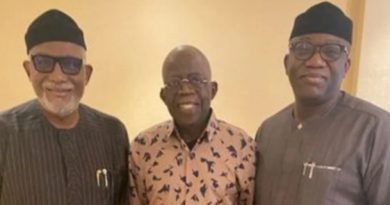Imo Governorship: Why Supreme Court dismissed Ihedioha’s application to reverse ruling
The Supreme Court on Tuesday dismissed an application filed by Emeka Ihedioha of the Peoples Democratic Party (PDP), asking it to set aside a judgement that declared Hope Uzodinma of the All Progressives Congress (APC) the Imo State governor.
With one out of seven justices dissenting, the court, led by the Chief Justice of Nigeria Tanko Mohammed, held that it lacked powers to sit on an appeal in its own judgment delivered on merit and in accordance with dictates of the law and justice.
Mr Ihedioha and the PDP had approached the court following its January 14 judgement that nullified Mr Ihedioha’s victory and declared Mr Uzodinma the winner of the election.
Mr Ihedioha was earlier declared the winner of the March 2019 election by the electoral umpire, INEC.
In its majority judgement read by Justice Olukayode Ariwoola on Tuesday, the apex court said the application for a reversal of the ruling lacked merit and accordingly dismissed it.
According to the judge, “it is settled law that this court has no power to change or alter its own judgement or sit as an appellate court over its own judgement”.
“There is no doubt that the court has inherent power in respect of matters within its jurisdiction, but certainly has no inherent power to assume jurisdiction in respect of a matter, not within its jurisdiction,” Mr Ariwoola held.
The apex court further held that granting the PDP and Mr Ihedioha’s request ”would open the flood gate by parties to all kinds of litigations”.
The apex court insisted that by the provision of section 235 of the 1999 Constitution, its decision on any judgment based on merit is final and shall not be reviewed once delivered under any guise, ”except for clerical errors”.
Justice Ariwoola also stated that by Order 8, Rule 16 of the Supreme Court, ”the general law is that it has no power to alter any judgment”.
He added that once such a judgment is delivered on merit, ”it shall remain forever”.
Mr Ariwoola said, “Certainly this court has no inherent power to grant what is being sought, it is beyond the powers of this court. There are no constitutional provisions for this court to review its own judgment.
“Inherent powers of the court can only be invoked if there is a missing link in the main body of the judgment and some steps must be taken to fill in the gaps or ambiguity so that the justice of the issues would be clear.
“To say the least, this court has no competence and indeed lacked the power to sit on appeal in its own decision where the finality of the Supreme Court is entrenched in the constitution and inherent power can only be invoked where there is the law to do so.
“This court cannot ridicule, alter any judgment under any inherent power, as doing so would bring the court into disrepute and ridicule.
“The application is liable to dismissal and is hereby dismissed for want of jurisdiction and competence.”
The six justices who agreed with the majority judgement said parties are to bear their respective costs.
In dismissing the application, the justices with the majority judgement include the CJN, Sylvester Ngwuta, Kudirat Kekere-Ekun, Amina Augie and Uwani Abba-Aji.
Dissenting judge
In his dissenting judgement, Justice Centus Nweze held that a judgement or order can be set aside on merit. He said the apex court has the power to overrule itself ”and has done so in the past”.
Mr Nweze nullified the declaration of Mr Uzodinma as governor on account of the wrong declaration.
The judge held ”that Mr Uzodinma mischievously misled the court into unjust conclusion with the unverified votes credited to himself in the disputed 388 polling units”.
“In my intimate reading of the January 14 judgment, the meat and substance of Ihedioha’s matter were lost to time frame. This court once set aside its own earlier judgement and therefore cannot use the time frame to extinguish the right of any person.
“This court has powers to overrule itself and can revisit any decision not in accordance with justice,” he said.
According to Mr Nweze, “the decision of the Supreme Court in the instant matter will continue to haunt our electoral jurisprudence for a long time to come.
He added that without evidence of meeting other constitutional provisions, ”the court misled itself into declaring Mr Uzodinma as governor”.
According to Mr Nweze, the APC and Mr Uzodinma misled the court to accept the allegedly excluded results in 388 polling units without indicating the votes polled by other political parties.
He also faulted the results from the said polling units without indicating the number of accredited voters in the polling units.
Mr Nweze recollected how Mr Uzodinma, during the election tribunal, admitted that he hijacked the result sheets from the electoral umpire officials and completed the result sheets by himself.
He said such results could not be valid without indicating the number of accredited voters.
“This court has a duty of redeeming its image, it is against this background that the finality of the court cannot extinguish the right of any person.
“I am of the view that this application should succeed. I hereby make an order appealing the decision of this court made on January 14 and that the certificate of return issued to the appellant returned to INEC.
“I also make an order restoring the respondents as the winner of the March 9, 2019 governorship election,” Mr Nweze held.




